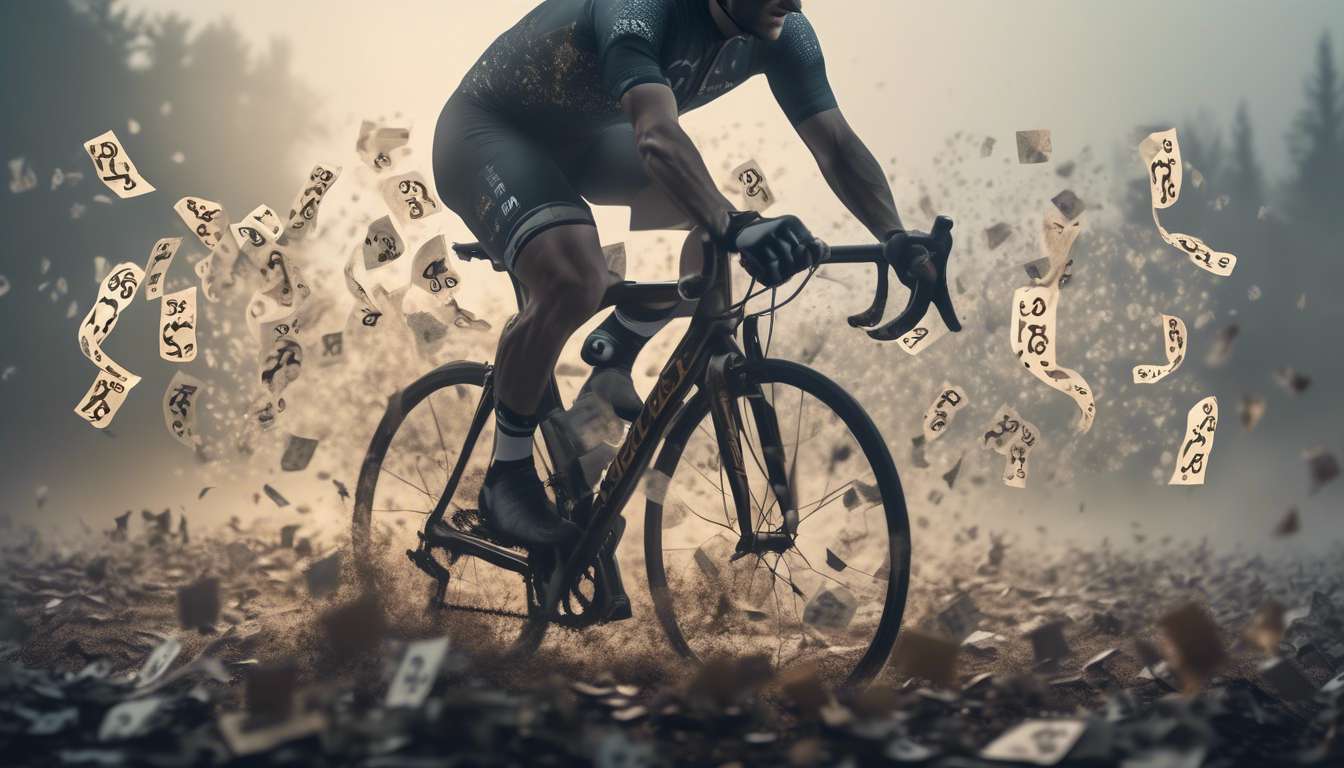As avid cycling enthusiasts and keen observers of the betting landscape, we often encounter a slew of misconceptions that cloud the judgment of both novice and seasoned bettors alike. These myths not only skew perceptions but also hinder our ability to make informed decisions. In our collective experience, we’ve seen how these misconceptions can lead to unnecessary losses and missed opportunities.
It is time we set the record straight and debunk some of the most pervasive cycling betting myths that have long been accepted without question. By shedding light on these fallacies, we aim to empower our fellow bettors with the knowledge to navigate the intricate world of cycling bets more effectively.
Join us as we unravel the truths behind five common myths, ensuring that we all approach our next betting endeavors with clarity and confidence. Together, we can make smarter, more strategic choices in the exhilarating realm of cycling betting.
Myth 1: Oddsmakers Have Perfect Predictions
Many believe that oddsmakers always predict cycling outcomes accurately, but their forecasts are far from infallible. When we dive into the world of betting on cycling, we quickly notice that predictions are, at best, educated guesses based on available data.
Odds give us a glimpse of probable outcomes, but they’re not crystal balls. They’re crafted from:
- Stats
- Past performances
- A bit of intuition
Yet, unpredictability is the sport’s true charm.
Let’s be honest, who doesn’t enjoy the thrill of an unexpected underdog victory? In our cycling community, it’s essential to remember that even the best oddsmakers can’t account for every twist and turn. Factors such as:
- Weather changes
- Unexpected crashes
- A rider’s sudden burst of energy
All of these can flip the script.
As we place our bets, we share the excitement and camaraderie of our collective uncertainty. We’re not just betting on odds but embracing the sport’s inherent unpredictability together.
Myth 2: Recent Form Guarantees Wins
Many of us mistakenly believe that a cyclist’s recent form ensures a guaranteed win. We’ve all seen athletes on an impressive winning streak, and it’s tempting to assume they’ll continue their dominance. However, betting in cycling isn’t just about recent form. Predictions based solely on current performance can be misleading.
Various factors can influence race outcomes, making the odds more complex than they appear:
- Weather conditions
- Team dynamics
- Unexpected health issues
When we place our bets, we must remember that cycling, much like life, is unpredictable. Relying solely on recent form can lead to disappointment. Instead, we should explore a broader range of factors when making our predictions.
By considering additional elements, we become part of a more informed community:
- Cyclist’s adaptability
- Race history
- The track’s unique challenges
Let’s connect, share insights, and embrace the unpredictability, knowing that our collective knowledge enriches our betting experience and enhances our sense of belonging.
Myth 3: Bet on the Race Favorite
We often think placing our bets on the race favorite is the safest choice, believing their past performance guarantees future success. However, as a community of cycling enthusiasts, we know that betting isn’t just about picking the most popular name. Remember, odds are not absolute indicators of a cyclist’s potential victory. They represent the bookmaker’s predictions of the race outcome, often influenced by public perception rather than objective analysis.
In cycling, variables like weather conditions, terrain, and team strategies can dramatically shift race dynamics. As bettors, we should dig deeper, analyzing these factors to make informed choices. While favorites have a history of success, they don’t always deliver as expected.
By diversifying our bets and considering cyclists with favorable odds who might be underestimated, we can enhance our betting experience.
Together, let’s challenge this myth and explore a broader range of possibilities in our betting endeavors, fostering a sense of unity in our shared passion for cycling.
Myth 4: All Races Are Equal
Not all cycling races share the same level of competition, prestige, or unpredictability. Each race holds its unique challenges and characteristics, which affect our betting strategies.
The Tour de France is a prime example of a race with:
- A rich history
- The world’s top cyclists
- High prestige and competition
In contrast, smaller races may not feature the same caliber of riders or media attention. These differences can heavily influence the odds and our predictions.
When placing bets, understanding these distinctions is crucial:
- A race’s prestige can impact the odds, as bookmakers adjust them based on the event’s significance and the competitors’ profiles.
- Predictions for high-ranking races might be more challenging due to the depth of talent.
- Lesser-known races might offer opportunities for those who are well-informed.
By considering the race’s context, we enhance our sense of community among fellow enthusiasts. Sharing insights and strategies leads to more informed and successful betting endeavors.
Myth 5: Cycling Is Predictable
Many assume cycling is predictable, but the sport’s dynamic nature often leads to unexpected outcomes. We’ve all been there, relying on our predictions, only to witness a race take a turn none of us saw coming.
The thrill of cycling lies in its unpredictability. Several factors can shift the odds in an instant:
- Weather changes
- Sudden crashes
- Strategic team decisions
This constant flux is what draws us in, making us feel part of a community that’s always on the edge of our seats.
When it comes to betting, we can’t overlook the complexity of the sport. While some may believe odds are set in stone, seasoned bettors know better. Cycling’s unpredictability is precisely what makes betting so exhilarating and challenging.
We embrace the uncertainty, knowing that every race offers a fresh opportunity for surprise. With each wager, we’re not just placing a bet; we’re joining a network of enthusiasts who thrive on the sport’s ever-changing landscape.
Myth 6: More Bets Increase Chances
Many of us might think that placing more bets boosts our chances of winning, but this belief often leads to more losses than victories.
When we dive into the world of betting, it’s easy to get caught up in the excitement, thinking that more predictions equate to better odds. However, increasing the number of bets doesn’t inherently increase our chances of success. Instead, it can dilute our focus and deplete our resources.
The odds are carefully calculated to favor bookmakers, and they’re not swayed by the volume of bets we place.
By spreading our bets thin, we risk making hasty decisions without thorough research, reducing the likelihood of informed predictions.
As a community passionate about cycling, we should aim to make strategic choices rather than impulsive ones.
Let’s focus on quality over quantity by:
- Analyzing each race and its odds with care
- Making informed predictions
- Avoiding hasty decisions
By doing so, we’ll not only enjoy the thrill of the game but also foster a sense of camaraderie and shared wisdom.
Myth 7: Insider Info Guarantees Success
Many of us believe that having insider information will guarantee a win, but this notion is often misleading. In the world of cycling betting, it’s tempting to think that knowing something others don’t could give us a significant edge. However, even with the best insider info, predictions can go awry. Races are unpredictable, and countless factors affect the outcome beyond any insider’s knowledge.
In our community, we cherish the camaraderie that comes with shared insights, but we must remember that insider info doesn’t magically tilt the odds in our favor. The complexity of cycling events means that relying solely on insider details can lead us astray. Outcomes are influenced by unexpected events like:
- Weather changes
- Rider conditions on race day
While insider info might offer us a piece of the puzzle, it’s not the entire picture. Successful betting requires a comprehensive approach, considering various factors and maintaining a healthy skepticism towards any single source of information.
Let’s embrace the thrill of betting wisely together.
Myth 8: Luck Is the Deciding Factor
Many of us often fall into the trap of believing that luck is the primary factor that determines the outcome of our cycling bets. It’s easy to think that the unpredictability of a race means our predictions are merely shots in the dark. However, let’s remember that betting is about more than just luck—it’s about understanding the odds and making informed decisions.
When we dive into the stats and analyze past performances, we elevate our betting strategies beyond mere chance. Consider the following:
- Each cyclist’s strengths
- Race conditions
- Historical data
In our community of cycling enthusiasts, we thrive on shared insights and collective knowledge. By engaging with others, we can refine our predictions and stay ahead of the curve.
We know that betting is an art that combines skill, research, and intuition. While luck might play a small role, it’s our preparation and connection with fellow bettors that truly guide us toward success.
Let’s embrace this shared journey and make betting a rewarding experience for us all.
How do weather conditions affect cycling race outcomes and betting strategies?
When it comes to cycling races, weather conditions can play a significant role in shaping the outcomes and influencing betting strategies.
Key Weather Factors:
- Wind Direction: This can either provide a tailwind that boosts speed or a headwind that increases resistance.
- Temperature: Extreme heat or cold can affect a cyclist’s stamina and overall performance.
- Precipitation: Rain can make roads slippery, impacting traction and increasing the risk of accidents.
Benefits of Understanding Weather Effects:
- Predicting Results: By analyzing how different weather conditions affect performance, you can better predict race outcomes.
- Informed Betting: Knowledge of weather impacts allows for more calculated and strategic wagers.
Being mindful of these conditions can help us make more calculated decisions when placing our wagers, ultimately giving us an edge in predicting results.
What role does team strategy play in cycling races and how should it be factored into betting decisions?
Team Strategy in Cycling Races
Team strategy is crucial in cycling races and should be carefully considered when making betting decisions.
How Teams Work Together:
- Support Leaders: Teams work collectively to support their leaders throughout the race.
- Control the Pace: By managing the race tempo, teams can conserve energy for their leaders.
- Protection from Wind: Team members shield their leaders from wind resistance, allowing them to conserve energy.
- Strategic Attacks: Teams set up well-timed attacks to outmaneuver competitors.
Benefits of Understanding Team Tactics:
Understanding each team’s tactics, strengths, and weaknesses can give an edge in predicting race outcomes. This knowledge allows for making informed bets.
Key Considerations for Smart Betting:
- Analyze team dynamics and strategies.
- Identify the roles within the team and how effectively they execute them.
- Assess the historical performance and adaptability of the team in different race scenarios.
By focusing on these aspects, one can make smarter betting choices in cycling races.
Can injuries to cyclists impact betting odds, and how can bettors stay informed about such developments?
Injuries to Cyclists and Betting Odds
Injuries to cyclists can significantly impact betting odds. Staying informed about such developments is essential for bettors.
Importance of Staying Informed
Checking reliable sources for updates on injured riders is crucial. This helps bettors make more informed decisions when placing bets.
Strategies for Bettors
- Keep track of injury developments.
- Adjust betting strategies accordingly.
- Capitalize on shifts in the odds caused by these injuries.
By following these steps, bettors can potentially enhance their chances of success.
Conclusion
In conclusion, debunking cycling betting myths can significantly enhance your understanding and approach to wagering on races.
Key Points to Remember:
-
Oddsmakers Aren’t Infallible: Relying solely on oddsmakers can be misleading, as they can make errors in their predictions.
-
Recent Form Doesn’t Guarantee Success: Just because a cyclist has been performing well recently doesn’t mean they will continue to do so.
-
Favorites Don’t Always Win: Betting on the favorite isn’t a surefire strategy, as upsets are common in cycling.
-
Not All Races Are Created Equal: Each race has its unique conditions and variables, affecting outcomes differently.
-
Cycling Is Unpredictable: Like any sport, cycling can be unpredictable, with many factors influencing the results.
Strategic Betting Tips:
-
Be Strategic: Approach your bets with a strategy rather than relying solely on luck or insider information.
-
Challenge Myths: By questioning these myths, you can make more informed and calculated betting decisions.
By adopting these insights, you can enhance your betting strategy and potentially improve your success in wagering on cycling races.




